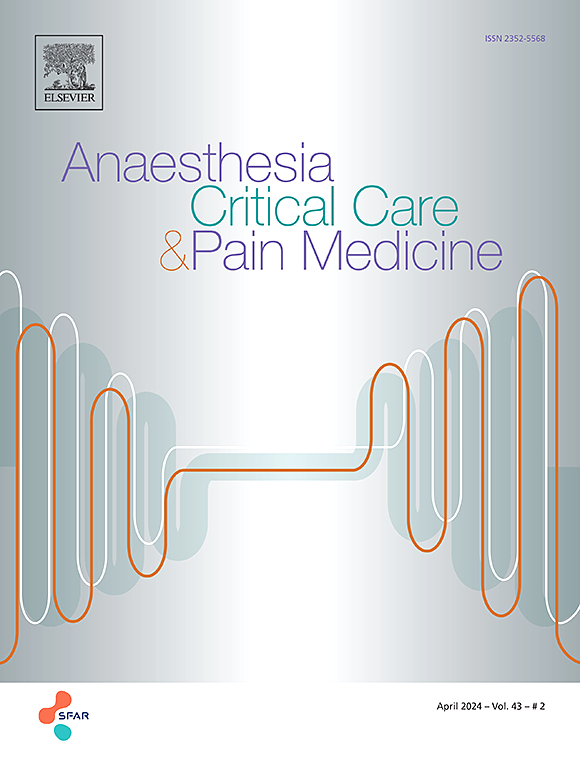心脏手术中持续危重疾病和长期生存:一项多中心队列研究
IF 4.7
3区 医学
Q1 ANESTHESIOLOGY
引用次数: 0
摘要
背景:在重症监护病房(ICU)和接受心脏手术的患者中,持续性危重症(ci)与较差的住院预后相关,但其与长期生存的关系尚不清楚。目的:探讨心脏手术患者pci与长期生存的关系。方法:在这项使用澳大利亚和新西兰重症监护协会成人患者数据库的回顾性多中心观察队列研究中,我们纳入了2018年1月1日至2022年12月31日(澳大利亚)和2020年12月31日(新西兰)在澳大利亚和新西兰接受心脏手术(冠状动脉搭桥术、瓣膜置换术或两者兼有)后入住澳大利亚和新西兰83个icu的所有成年人(≥16岁)。主要终点是ICU入院后4年的生存时间。我们使用Cox比例风险模型分析了pci(定义为ICU住院时间≥6天)与ICU入院后4年生存时间之间的关系。结果:我们纳入了73,462例患者(90.8%为择期,9.2%为急诊),其中5087例(6.9%)发生了pci。ci与较短的生存时间相关(风险比[HR]: 3.14, 95%-CI: 2.77-3.55)。随着ICU时间的逐渐延长,生存时间逐渐减少(HR每增加一天:1.02,95% ci: 1.01-1.03)。结论:ci与较差的预后相关,这种情况在长期随访中持续存在。需要进一步的研究来确定潜在的可改变的风险因素。本文章由计算机程序翻译,如有差异,请以英文原文为准。
Persistent critical illness and long-term survival in cardiac surgery: A multicentre cohort study
Background
Persistent critical illness (PerCI) is associated with poorer in-hospital outcomes in patients admitted to an intensive care unit (ICU), and in patients receiving cardiac surgery, yet its association with longer-term survival remains unclear.
Objective
We investigated the association between PerCI and long-term survival in patients receiving cardiac surgery.
Methods
In this retrospective, multicentre observational cohort study using the Australia and New Zealand Intensive Care Society Adult Patient Database, we included all adults (≥16 years) admitted to 83 ICUs across Australia and New Zealand after cardiac surgery (coronary artery bypass graft, valvular replacement, or both) from January 1st 2018 to December 31st 2022 for Australia and 31st December 2020 for New Zealand. The primary outcome was survival time up to 4 years after ICU admission. We analysed the association between PerCI (defined as ICU length of stay ≥6 days) and survival time up to 4 years from ICU admission using a Cox proportional hazards model.
Results
We included 73,462 patients (90.8% elective, 9.2% emergent), of whom 5,087 (6.9%) developed PerCI. PerCI was associated with shorter survival times (hazard ratio [HR]: 3.14, 95%-CI: 2.77–3.55). As ICU stays became progressively longer, survival times progressively decreased (HR by additional day in ICU: 1.02, 95%-CI: 1.01–1.03). PerCI was associated with larger reductions in survival times in patients aged <65 years (HR: 5.61, 95%-CI: 4.72–6.67) compared to patients ≥65 years (HR: 2.83, 95%-CI: 2.48–3.23, p-interaction <0.0001). However, there were no significant differences amongst the various types of surgeries, and between elective and emergent surgeries.
Conclusion
PerCI was associated with poorer outcomes, and this persisted during longer-term follow-up. Further study is required to identify potential modifiable risk factors for PerCI.
求助全文
通过发布文献求助,成功后即可免费获取论文全文。
去求助
来源期刊

Anaesthesia Critical Care & Pain Medicine
ANESTHESIOLOGY-
CiteScore
6.70
自引率
5.50%
发文量
150
审稿时长
18 days
期刊介绍:
Anaesthesia, Critical Care & Pain Medicine (formerly Annales Françaises d''Anesthésie et de Réanimation) publishes in English the highest quality original material, both scientific and clinical, on all aspects of anaesthesia, critical care & pain medicine.
 求助内容:
求助内容: 应助结果提醒方式:
应助结果提醒方式:


